After Careful Consideration (We Went With Another Project) with Lindsay Puckett, MD
From the Ground Up Episode #8
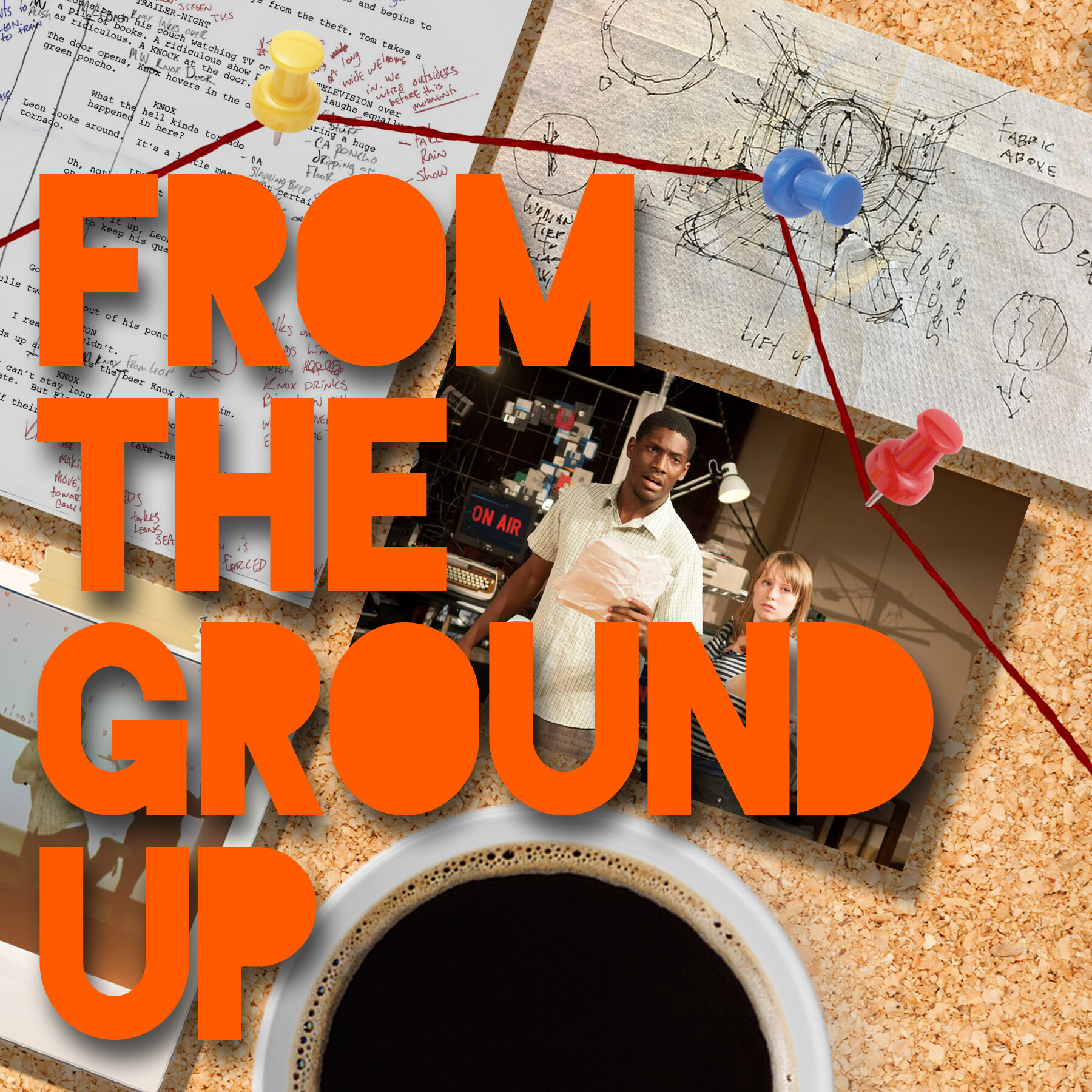
Do research scientists go through the same sort of grant application process as theatre artists? Medical doctor Lindsay Puckett describes how she pitches her research projects with language that includes facts as well as storytelling.
“What makes you even think that you could begin to attack the question that you want to attack?” —Dr. Lindsay Puckett
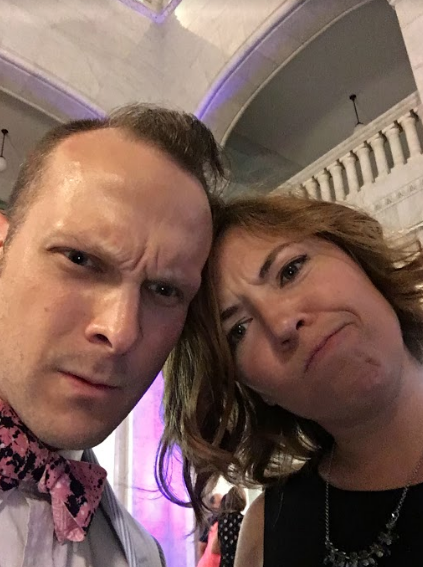
Jeffrey Mosser: From the Ground Up is supported by HowlRound, a free and open platform for theatremakers worldwide. It's available on iTunes, Google play, and howlround.com
Dear artists, welcome to the eighth installment From the Ground Up. I am your host, Jeffrey Mosser. So glad to be with you again today. Thus far, I've been able to bring you a broad range of ensemble based artists, but somewhere throughout my work, I started wondering if other nonprofits, other than the arts, shared similar strategies and challenges of finding support from grants or philanthropic sources. When it comes right down to it, I believe that the practice of ensembles and devised work is really research. So, I started thinking about other researchers in scientific fields and I quickly remembered today's guest, who is a friend of mine from college, who was so good at Improv that I thought she was starting a scene when she told me that she was actually premed. Dr. Lindsay Puckett is currently an attending physician and clinical instructor at the Department of Radiation Oncology at the Medical College of Wisconsin in Milwaukee. And when I originally interviewed her in April 2018, she was a physician in radiation oncology, as well as a clinical researcher and basic science laboratory researcher at Northwell Health in Long Island, New York. This is likely the shortest interview we will be broadcasting, which is ironic because this is probably the person that I know the best. But without giving anything away, let me just say that I am blown away by the parallels of the medical grant process to the theatrical grant process.
There is this mysticism around hospitals, or at least that's the way I feel because I don't know the ins and outs of them and I assume that they have access to everything, and that quality is always going to be the same. Just like you sometimes hear preconceived notions of what theatre is going to be. Right? And I'm sure people who aren't in the theatrical fields say, "Well, yeah. You've got those resources, right?" Well, I just assume that everyone's got an MRI machine, right? We all have one of those tubes that I can get in, right? That's, no. That's actually a really expensive tool. A point of clarity before we get started. She refers to a health system in this recording. A health system is a group that owns multiple hospitals. So, like the Mayo Clinic of Rochester, Minnesota has multiple locations and they are part of a larger health system that spans many states. Yeah, I think that's all the terminology that we have to hit today. Alright, folks, here we go with my friend and emergency contact, Dr. Lindsay Puckett.
***
Jeffrey: I'm most curious about is how do scientists, how do doctors, how do medical professionals reach out for grants or other funding? I feel like an academic resource. How does that funding work for you and how have you found success with it in applications or otherwise?
Lindsay Puckett: Cool. So yeah, I'll be curious how similar or different it is, but I think probably the best way that most people have luck getting grants is through something more local. So, a lot of the things you can apply for are regional. So, if you work with a university or a large hospital system, it's possible that they have in-house grants that you can apply for. Like for my research study now, one of the ones I was at a foundation that patients donate funds to or organization donates funds to. And then, you write your application and they decide how to divvy out the funds. So, those are good at like a smaller level. It's kind of, in some ways similar to a scholarship process too. You're most likely to get the ones that are at like a local level. And then online, there's a resources, there's one website, it's called a Trialect, which has a whole bunch of science grants. And so, you can tell it sort of who you are and what types of things you'd be interested in applying for. And it'll send you everything in that vein. So, I'm on for like breast cancer research; and so, every month or two it'll be like, "Oh, there's this new grant available you can apply for." And those tend to be more like national ones. So, those are tough to get. Still worth applying for and if you can get them, they're fantastic. They'll fund you in like a big way more in the order of part of your salary and and that kind of thing. Where a lot of the more regional ones will be for like under 50,000 which still sounds like a lot, but as you know in the greater scheme of things, that doesn't actually cover that much.
Jeffrey: Yeah. Yeah. What will each grant let you cover or is it different from grant to grant? Like this grant is for operational support, meaning like hiring staff or hiring other professionals or is it only like we will only fund you- Are there qualifiers on it, I guess, is what I'm asking?
Lindsay: Yes. So, there are some things that sometimes you want to find with your grant are like staff. Like staff's very expensive. So, some smaller grants will say specifically like, "This is not to be used for any staff funding." And then they also, some of them want to rule out that you're sort of paying yourself with it. So, they'll specifically limit that. Other ones will have stipulations, like it cannot be used for travel for like a meeting because the most common things after you get one or you would take your research and presented at some national meeting. Publication fees for certain journals when your research is all done and you want to publish it, it can be nice to use grant funds for it, but some grants will prohibit that. So, it's not too uncommon for it to kind of have some stipulations. Where something like you need supplies. So, you know the supplies that you would use for your research, those are usually covered by a grant. And a lot of grants want at least some structure ahead of time of like, "This is roughly what I think I'll use the money for." And I think that a lot of times, they have the prerogative where they think what you're using it for is not great. They can say, "No, no. You got to use it a little bit different."
Jeffrey: One the big questions there, too, is when an artist writes a grant or say we want to use this money, but we don't know what the final product is going to be. And so, one of the things that I find really fascinating is you have a theory, right? You apply for a grant with a theory in mind, you have an end result that you need to figure out. Can you talk a little bit about like how do you even sort of, I don't know. Maybe it's too big of a question, but how do you even start to phrase that sort of idea? That we have an idea that may or may not work?
Lindsay: I'm sure it's probably similar where some people will be happy with just the question itself of like, "I want to look at cardio toxicity in breast cancer patients. So, I'm going to look at patients who had some treatments and I kind of want to do this." Like that might be enough. But I would say by and large, most of the grants that you apply for it, they want a lot of specifics and some preliminary data to kind of show that you can do what you're setting out to do. Basically, they want there to be something tangible from their funds. So, if you have a project that would cost $100,000 to do at their grant is only for $10,000, it's like a catch-22 where nobody wants to put money in and tell someone else already has money in or like, "Well, at least it'll pay for this part or it's enough to get us going," and then from there, we can get like more money. That first bit of funding I feel like is so key, and I'm sure it's the same in the arts, too, of like when someone said, "Ah yes, this is a worthwhile endeavor," then it's easier to get that second and third piece.
Jeffrey: Yeah. You talked about having specifics. What sorts of specifics? My past experience or the past results we've had with other tests or otherwise?
Lindsay: Yeah. So, they want like a little bit as prelim data. Like what have you done so far? What makes you even think that you could begin to attack the question that you want to attack? And then for us, I don't know if it's the same, you usually have a series of specific aims. So basically, like aim one I want to do this and these are step one, two, three, four, five. These are the things that I'm going to do to accomplish that aim. Aim two, aim three, you don't want it too complicated, where people who have no idea about the science you're talking about or "I don't know what that means. Sounds kind of good or kind of terrifying," but more like, "Okay, I can kind of see where if you did these things it might let you get to where you want to go."
Jeffrey: So often with like theatre though, it's hard to say we had a success with this show. We want to do something completely different, and we need money for it.
Lindsay: I think that what you're saying though is probably still similar because what the people who would be giving the funds look at is they're like, "Well, they did two other shows and they did it on a shoestring budget. So, they have experience doing shows, and doing shows with the amount of money that we're giving them. At least we know that they're not deranged and think that they can do some big massive thing with this amount of money, and they can't."
Jeffrey: Yeah. Yeah.
Lindsay: Or there's the assumption that somehow, those shows were successful, which maybe they know or maybe they don't know, but at least the fact that you did them and completed them says as something.
Jeffrey: Yeah. Yeah. And so, I assume, once you submit the grant application, then it's like out into the ether and there's a grant panel. Do you know anything about what panels look like or what a scientific panel might look like or how they sort of operate?
Lindsay: So, it's totally different depending on who's doing it. And that's sort of interesting, too, because it can be something where it's very scientific and there's a lot of renowned people, or it can be very focused on the donors. So, I applied for like a regional grant that's specific to Long Island. And a couple of years back, they funded a project similar to what mine was. And so, I had sort of an intermediary, like a grant specialist and she was like trying to like pick a little bit and find out the specifics of what they wanted. And they wanted something that was more science heavy. So, I can kind of see where this would be in the lab versus something that's like, this is in the clinic looking at patient outcomes or something like that. So, I knew they wanted a heavy science focus. So, I tried to play that up in the grant. Because as you know, almost everything has different sides to it. So, you can play up different features depending on what's going to work with your audience. But in the end, the donors, for whatever reason, they just decided they wanted something like super science heavy, not for any particular reason, just that's what they wanted to do. And so, they went with a different one. I got to go to like the final levels of submission for it, but they ultimately went with someone who is like what they said they wanted to do, more science-y in a different way than mine was. So, it's like casting. I feel like they already have some idea of what they want. And if you can figure out sort of what that is, it gives you a leg up on everyone else. Some of them do have very specific criteria and they'll grade you and everything from is it well thought out to is this plausible? What's the likelihood that they'll actually be able to do what they set out to accomplish? And then, the total flip side of like, "Eh, this one looks nice."
Jeffrey: Yeah. So, it could be like, "Oh, they formatted this better than everyone else did."
Lindsay: Yeah. I love this rose scented paper. I mean, most good grant proposals go on rose scented paper. You don't want to put your health in a disadvantage.
Jeffrey: I see, I see. Oh, that's fascinating. So, the makeup of the committee could be different and you sort of do a little research into what the past recipients have gotten before you sort of examined yours.
Lindsay: Exactly.
Jeffrey: Okay. Oh that sucks to hear that it's like an audition. That they already have something in mind. They already are sort of seeking a particular.
Lindsay: Yeah, Another part of it, too, part of grantsmanship is selling it. So, I think that's something that doctors and scientists aren't always the best at, is maybe their science is amazing, but if you can't describe that to the people who are going to be doing the grant and sell it sort of in a palatable way, just break it down to its most simplistic. Then a lot of times, those ones don't go through, even if maybe that was the best idea, but there's definitely like a game to it and a certain showmanship. At my lab, the lady who I worked with was like phenomenal at grants. Like she taught me a lot and clarifying and everything else. And really what she did was, she was just really good at breaking things down and taking it to a level that- I don't know. Because it was already science-y for scientists, I didn't think of making it so simple, but by doing that, it was like, "Oh, well this is so obvious. Of course you'd want to answer this and do this, and anyone could understand it." And then the Improv rules like also apply. Like within your story, you kind of want to bring it back like three times. So, have it in the middle, you have something again, and then at the end, that simple progression of like, "Okay. I've got this, and I know what to say."
Jeffrey: Is there a difference in academic versus sort of a more private donor?
Lindsay: There can be. I mean, it depends whether you're going to use some kind of like intermediary type body or if you're just like a donor, you kind of get to make your own rules. Like I met with some people who are possibly going to give like great big donations. And then I feel like for a really big donation, it's not as like spelled out. It often is more like, "Well, it'll kind of go towards this," and they can give some examples of what it might go towards. And then, those people once they have the funds, I can just kind of go for it. There's a lot of faith put in them versus I think a lot of smaller grants tend to want to know a lot more specifics upfront of how exactly are you going to use this?
Jeffrey: Yeah. Do you sort of like make it the layman version and then sort of the science-y version, or do you sort of like need to pepper the terminology where people will understand it and where it's useful?
Lindsay: Yeah. So, you ended up rewriting and rewriting depending on who your audience is. And sometimes, it's hard 'cause you don't realize how much jargon you have in there and it's like, "No, they don't care about this. I need to really simplify it." Like if I'm just someone who supports research versus I'm the scientist. Like how is that different? I mean, you don't want to dumb it down too much, but I think that's a really important skill to have, especially if you want to be successful in your grants.
Jeffrey: Yeah. Yeah. That's the thing about like a medical grant. It feels like everything needs to be sort of a life or death research query or it has to be something that has really a knowledge threshold. Like, we have to understand this in order to create, prevent, you know? Yeah.
Lindsay: Yeah. Usually, there's something very targeted that they want. So, whether it's like we want to minimize toxicity or we want to improve survival, they'll know ahead of time what level they want it at. So, I would say a lot of that goes towards the upfront. Like we care about now where there's some stuff to do with like the after effect of treatments, but so much of it is like- I don't know. I don't want to say narrow minded, but it's all focused at that front line, where there's a bigger picture that just doesn't get funded quite as much.
Same way like more sexy topics will get funding versus other topics, which I don't know, are really important. Lung cancer has these negative connotations like, "Oh, they must be a smoker. They must be bad, this and that." So, there's so much less funding for that available versus breast cancer, like everyone supports helping breast cancer. So, you're up against challenges right off the bat.
Jeffrey: It feels like anytime a new play is being developed or being worked on, it's always talking about something that's sort of happening, or something that's relating to now. Do you ever get any feedback about grants that you didn't get?
Lindsay: Not, no. Actually not much. There was one where they said that they would. And the feedback was basically like, "Yeah. We went with a different project. Your project was good and we went with a different one."
Jeffrey: Hm, okay. Yeah. Thanks for playing.
Lindsay: But the other, actually, that's not true. The one other feature that they told me was basically I want to say receivables, and I don't think that's quite the right word, but basically, depending on who's funding it, like if it's a pharmaceutical or like a company, how will the outcome of your research potentially benefit them down the road? So, on the one hand, it's philanthropic and they just want to support some different research projects. But on the other hand, Eh, are we going to get that many things that are going to help us out of it? I think the majority of either big corporations, pharmaceuticals, imaging companies, or things like that where it is like a big business, are going to treat it like a business. And even though they want to appear philanthropic, like ultimately, besides just saying like, Oh, look. We supported this terrific research, which helped people. They also want something that helps them.
Jeffrey: Do you see like specific grants just saying like, "We will only pay for your staff," or "We will only pay for research that has this outcome"?
Lindsay: So, there are a lot of bigger grants that are specifically designed so that it'll pay for part of your salary. Basically, it'll enable you to do the topic you want to do. So, like right now, I'm doing a smaller study. If it's successful, then I'll use the fact that I did the smaller study and say, "Hey look, I should do the bigger version of this. It'll tell us so much more." And those grants would probably have specific funding set aside, what would pay one or two days a week of my salary. So, fund me at about 20% so that I actually have that time, as well as the money to do the study and like make sure it gets done.
Jeffrey: And this was the other funny thing. So since you are employed by the hospital, the hospital gets the money, it's all dedicated to your lab or is it dedicated to your research in particular?
Lindsay: Yeah, they manage it. There's kind of specific things, basically so it doesn't get abused. So, if you're with a system, it'll go to the people who manage it and then you can spend it for the things that you need. It's common in academic medicine to have it where, let's say normally they're paying you to work five days a week or four days a week. Then if you get that grant, then they, as the hospital, basically only has to pay four days a week and you'll use that other one, that other day, for your grant project. And that just comes from the grants. In essence, the hospital's happy 'cause they're paying you less. So, it's like less net money that they have to pay you. But at the same time, they're also releasing you basically a day a week where you're not doing their work. You're doing the grant work. And hopefully, that makes the health system look good and furthers medicine and all that jazz.
Jeffrey: Yeah, yeah, yeah. But you the, the doctor, are put on the front line for even reaching out for the research, right? The hospital doesn't necessarily, wouldn't necessarily, write a grant.
Lindsay: So, they do employ grant writers actually. And if you're at one of the five institutions that gets like 75% of the grants, it's absurd. There's like five or ten institutions that legitimately get almost all the funding in this country. But if you work at one of those, one of the reasons why you are so successful is they have a whole grant writing team. So, you put it in a little bit of your idea. The grant writer spits out a whole bunch of really beautifully written, perfectly designed grantsmanship so that you'll be so competitive and you'll get that. Plus, they actually do look at where you're trying to do the research. And a lot of grants will give you points for or against you, depending on if they think that the institution that you're at has enough resources to support you in what you want to do. So, if they think that you're at Podunkville Community Hospital and there's no way you can do your fancy imaging research or something like that, they will legitimately count it against you, which is good and bad.
Jeffrey: Well, shouldn't we all be on the same team? Like, shouldn't we all be like- I don't know what else to say about it. Just feels like that's a huge challenge as a huge frustration, I can imagine, for folks who are first time grant writers or have the bright idea, but they don't have the resources immediately available, and they go, "Oh, woof."
Lindsay: There are a number of grants that are designed for early career scientists.
Jeffrey: Okay.
Lindsay: And so, they'll specifically be you and the opportunity of your peers who are in the same boat, where they're just starting out. And so hopefully, you do and avoid some of that stuff that's entrenched; but at the same time, you still can't totally, 'cause they still have that gold star from being at the number one place in the country or whatever. And just by being there, they've already got a leg up. Everyone wants to bet on a winner.
Jeffrey: And even if your first grant might've gone up in flames.
Lindsay: Yeah, they have no idea.
Jeffrey: Let's say you get really great results, do they reach out with more funding following that? Is there any chance that someone might, say it is through a pharmaceutical and they'll say, "Hey you really figured this out, keep going. Here's another billion dollars."
Lindsay: So, I'm working on that. My very first grant that I got, it was 10,000. And they told me that it was possible that the organization that donated it, if I had good results, might be willing to consider doing a second year. So, basically doubling it up. Based on my like early results from what I got, they invited me to come to this thing. It's called like Ladies' Day out.
Jeffrey: Okay.
Lindsay: It's at some country club with a bunch of high saluting donor-y types. And so, I'll like probably give like a five minute presentation on my research and then what we're going to accomplish. But by them bringing me there, it's possible that someone will listen to it and be like, "Look, that's so fabulous. I definitely want to donate to this. Like how do I get in and how do I contribute to this funding?"
Jeffrey: Are there rooms like that, where you just get to like talk about your results and people throw money at you?
Lindsay: No. No. It's weird. It's like if you can get among the donors, it's very possible that someone, if they're intrigued by what you're doing may just have additional funds for you. And the same thing at the big organizations. Our hospital system's very big so I've tried to get to know the Grants Office. And so, every now and again they'll reach out to me and say like, "Oh, I heard about this grant coming up. Do you want to throw in your name?" Or they'll like select a handful of things that they know are going in on in the hospital to sort of put forward to bigger donors of like, "Oh, would you want to do this? Even though I haven't formally applied."
Jeffrey: Holy cats. Yeah.
Lindsay: Yeah. There's a lot of layers.
Jeffrey: Yeah, yeah, yeah. Is there any funding we haven't talked about? What other forms do you seek out?
Lindsay: Yeah. So actually, that's a good point. Some of the money that I got wasn't technically a grant. It's patient donated funds. So sometimes within systems, they'll just have funds that aren't necessarily set up as a grant. And I talked about my project and one of the doctors is like, "How are you funding this?" And I was like, "Well, I have some grant funding and I'm applying for more stuff." And she's like, "Well, I have some funds. Reach out to me and we'll set it up." And she gave me $10,000 towards my project. And then, I reached out again a second year. And she was willing to continue to do that. So, I think that there's resources like that that are actually pretty common in bigger organizations, where people donated money and then left it sort of in the trust of someone else if they think that there's a worthwhile project. It's not a grant per se, but you can also put that on your resume and it also counts towards like when you're applying for future grants. It's like, "Oh, well now I have like $50,000 worth of funding instead of $10,000."
Jeffrey: Yeah.
Lindsay: And so, they look at it sort of jointly as opposed to, "Oh, well how much came from the grants versus here or there." However you're funding it, it just looks favorable if you can fund it. I mean, there was, I also got funding through someone else who had gotten the grant and then couldn't do the project that they wanted. And so, we petition the organization, could we use it towards my project instead of what they had originally allocated it for? And otherwise, that money just would've gone to waste. So they said, "Yeah, okay. That's fine." Then, there was more money.
Jeffrey: Early on here, we were talking, you said the way you sort of wrote your grant proposal was sort of with an attack or like how you attacked the question. Do you frequently think about writing it as like, "Hey, let me, let me-" Do you write with a particular attitude in mind?
Lindsay: No, I wish that was the case, actually. And maybe I should've done that, but I feel like the problem in general is they tend to be a little too dry, very science-y like, and then I will go on to ask them this and do this instead of really- What you're suggesting of, if I write it like an attack piece of, "And I'll take this head on and make it to my next round," and then attack.
Jeffrey: Yeah, but don't you avoid sort of emotional coloring of the grant?
Lindsay: Actually, that's not true. Yo do want to color it. And obviously, you don't want to mislead, but it's like politics. Where it's like you want to present it in the most favorable, like the best possible scenario. So, if I think that there's a 10% chance that it could lead to something really great, that definitely goes in there with a strong like, "And this will lead to that," as opposed to, "And is possible, maybe if we get this right, that potentially it could go there." Wherein like a scientific paper, you would write it that way, but for the grant, as long as you're not being disingenuous, which people will see through and also probably disqualify you, if it's possible, and potential, and not unreasonable, then go sell it. We're going to change the world today.
Jeffrey: Yeah, sell your best possible outcome. I like that. Great. Well, I think that's all I've got for now. If I walk away and I have any burning questions, I'll holler at you. Also, can you tell me your favorite form of transportation?
Lindsay: Airplane, until teleportation goes through.
Jeffrey: Your favorite salutation?
Lindsay: Probably "hiya."
Jeffrey: Your favorite exclamation?
Lindsay: Yowza.
Jeffrey: What does the word ensemble mean to you?
Lindsay: A group working together.
Jeffrey: What would you be doing if you weren't doctoring?
Lindsay: My stock answer is that I would be an automated voice.
Jeffrey: I would love you to ask me to enter my PIN at any time, I would do that. Maybe not right now. What's the opposite of of doing medicine?
Lindsay: That's a tough one. What's the opposite? I mean, I guess reality TV.
Jeffrey: Yes, that does do harm. You're right. That's correct. And then, your favorite kind of ice cream?
Lindsay: Chocolate peanut butter.
Jeffrey: Oh, correct answers all across the board. Thank you, Lindsay. I'm going to turn all this equipment off and then we can say hello to Allie and the baby if you have time.
Lindsay: Yes.
Jeffrey: Yeah. Okay, just a second.
***
Jeffrey: I've carried so much of this interview with me, especially that line about if you think there's a 10% chance. We all create from that place of the 10%, similar to the idea that Stephanie Mickey gave us about aiming for that blue sky. Aim for is possible. Make for that, right? Because that's what excited us about the project in the first place. At the same time, be genuine about what you're looking for in your grant application. Yeah. Genuineness, blue sky. Hmm. I hope you were able to make some connections with this one. Our next interview will be with Quita Sullivan from the New England Foundation for the Arts or NEFA. NEFA has been mentioned quite a few times already on this program as a champion for ensemble-based work. They have a unique sort of grant panel and mentorship process that really blew me away, and they grant to places beyond New England. So don't let the name fool you. In fact, they have a lot of open applications right now and many of them run throughout the year. So, go check right now. Perhaps you have a grant application story. We would love to hear it. Put it in the comments section here or on our Facebook or Twitter pages, or as always, you can always email us [email protected]. Thanks for listening, folks. I can't wait to connect with you again on From the Ground Up.


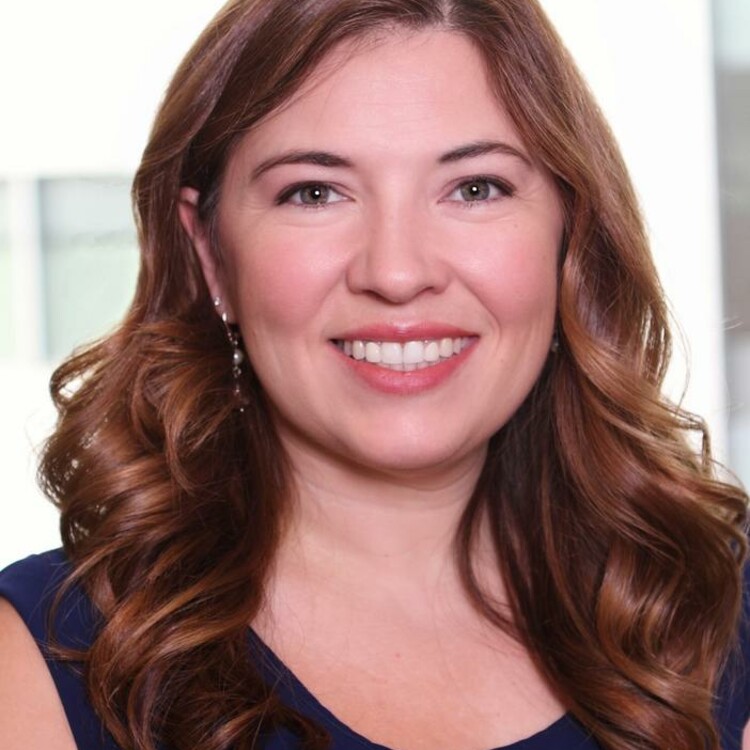
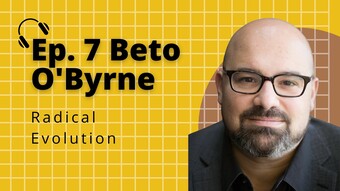





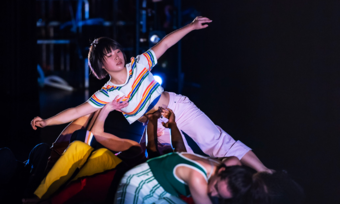

Comments
The article is just the start of the conversation—we want to know what you think about this subject, too! HowlRound is a space for knowledge-sharing, and we welcome spirited, thoughtful, and on-topic dialogue. Find our full comments policy here